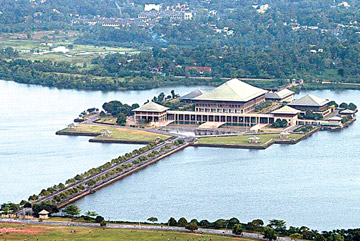Underscoring the importance of Parliament
 The
ethnic problem has been the bugbear of Sri Lankan politics since the
issue of ‘50-50’, the proposal for equal power-sharing between the
Sinhalese and Tamil communities, came up in the 1940s. The
ethnic problem has been the bugbear of Sri Lankan politics since the
issue of ‘50-50’, the proposal for equal power-sharing between the
Sinhalese and Tamil communities, came up in the 1940s.
The Soulbury constitution, which was intended to address minority
grievances, was one essentially foisted on the Sri Lankan polity by the
British Colonial Raj.
It was in order to rectify problems which occurred in the 1947
constitution that the Draft 1972 Constitution was considered at length
by Parliament sitting as a Constituent Assembly. It was a well
thought-out fusion of viewpoints from the Left to the Centre.
The author of that First Republican Constitution was the renowned
legal expert and veteran Leftist politician Colvin R de Silva. His
primary target was the removal of vestigial colonialism and the
incorporation of socialist values.
Kandyan Convention
He did not devote much time to ethnic issues, except that a provision
to give Buddhism its ‘rightful place’ was included as a corrective for
the British colonialists’ betrayal of the Kandyan Convention of 1815.
|

Parliament, place for good governance |
However, he did include recognition of the fundamental human rights
and freedoms of all citizens - ignored in the Soulbury constitution.
These included the right to equality, freedom from arbitrary deprivation
of life, liberty and security of person, freedom of thought, conscience
and religion, freedom to enjoy and promote one’s culture, freedom of
assembly, freedom of association, speech and expression, freedom of
movement and of residence, and freedom from discrimination.
The mechanism for protecting these rights included a constitutional
court and an Ombudsman. His thinking was that inclusion of socialist
values and a bill of rights would address any divisions on ethnic lines.
This constitution has been criticised as depriving the minorities of
their rights, almost solely based on the fact that it did away finally
with the supremacy of the British Privy Council in the legal affairs of
Sri Lanka - an impossible position for a sovereign country.
By way of contrast, the 1978 constitution was a document hastily
drawn up on the basis of the French Gaullist constitution by a
constitutional expert close to President J R Jayewardene.
It was the adoption of this basic law which led to the joke about Sri
Lanka’s constitution being a periodical.
So fraught by defects was the 1978 constitution that Jayewardene
himself felt the need to bring in 13 ad-hoc amendments within nine years
of its adoption.
The late Neelan Thiruchelvam was the brains behind the proposal
brought by President Chandrika Kumaratunga to establish what was, in
essence, a federal republic. This was an attempt to force on the country
a solution which had not been the subject of previous consultation and
it trod heavily on the toes of the majority community.
This is not to gainsay the undoubted sincerity with which Neelan
dealt with the problem, for which he paid with his life, a victim of V
Prabhakaran’s paranoia. Nevertheless, one must take issue with the
approach of pressing it, almost un-discussed, on a not too receptive
citizenry.
Although the 1978 constitution did away with the supremacy of
Parliament, this body remains the highest repository of the common will
in its multiplicity.
Ethnic groups
It is by virtue of the very diversity of viewpoints and backgrounds
of the tribunes gathered therein that the House has legitimacy as a
de-facto constituent assembly.
Consider the means by which America’s founding fathers went about
writing the first modern constitution. In order to resolve differences
between the states, representatives from each gathered in a
Constitutional Convention at Philadelphia.
After extensive discussion and debate, and a process which lasted
four months (more than one and a half years if one takes in to account
the earlier Annapolis Convention), the US constitution was ready for
signing.
The Bill of Rights, considered then as now an essential part of the
US constitution, took another three years to complete.
Obviously, despite the fact that the American Revolution was running
out of money, the US Founding Fathers took their time about formulating
a document which they could all sign with an easy conscience.
In the same manner, it behoves Sri Lankans to be patient while a
solution which is acceptable to all ethnic groups in the country is
hammered out through democratic discussion and debate.
Surely this is better than forcing a half-baked, un-discussed and
unwanted ‘solution’, which may create even more problems in the future,
down the throats of all communities. In this case, the old saw ‘less
haste, more speed’ is truly applicable. |



